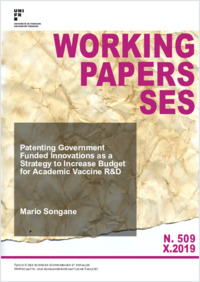Patenting government funded innovations as a strategy to increase budget for academic vaccine R&D
BP2-STS
-
01.10.2019
30 p.
English
Vaccine development is a lengthy, expensive and risky venture, with the research and development (R&D) process costing billions of dollars. The pre-clinical stage of vaccine R&D is largely performed by academic research institutions, then continued by the pharmaceutical industry though licensing agreements, taking the most promising candidates to the clinical testing stage. Governments play a major role in de-risking the early stages of vaccine R&D for the pharmaceutical industry through the funding of research in public institutes and academic research laboratories, and providing loans and tax credit to pharmaceutical companies involved in vaccine R&D. Through these initiatives, governments fuel the industry, shape markets and aid the development of novel products and technologies. Many of the blockbuster vaccines currently on the market benefited greatly from government funding, however, pharmaceutical companies are reaping most of the rewards of the billions of dollars these vaccines generate every year. The present review will discuss the role that government funding and academic research has played in vaccines R&D. Furthermore, it will discuss some of the elaborate schemes pharmaceutical companies use to reduce their tax payments, and how strategies such as patenting government-funded innovations can help ensure that governments receive a share of the generated revenues.
- Collections
- Faculty
- Faculté des sciences économiques et sociales et du management
- Language
-
- English
- Classification
- Economics
- Other electronic version
- Series statement
-
- Working Papers SES ; 509
- License
-
License undefined
- Identifiers
-
- RERO DOC 327410
- RERO R008981962
- Persistent URL
- https://folia.unifr.ch/unifr/documents/308099
Statistics
Document views: 249
File downloads:
- Document: 343
